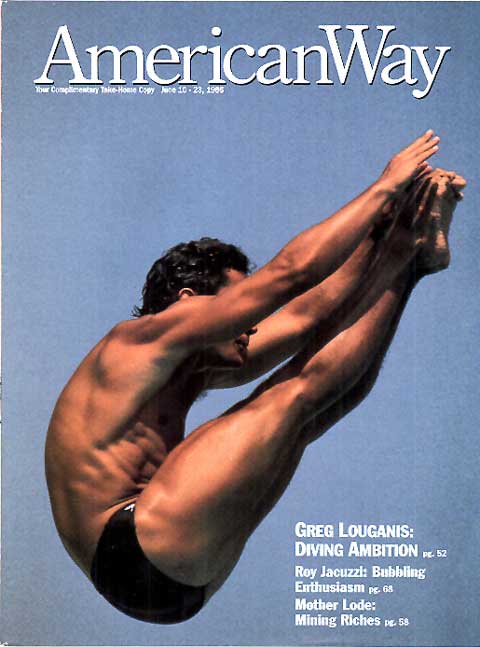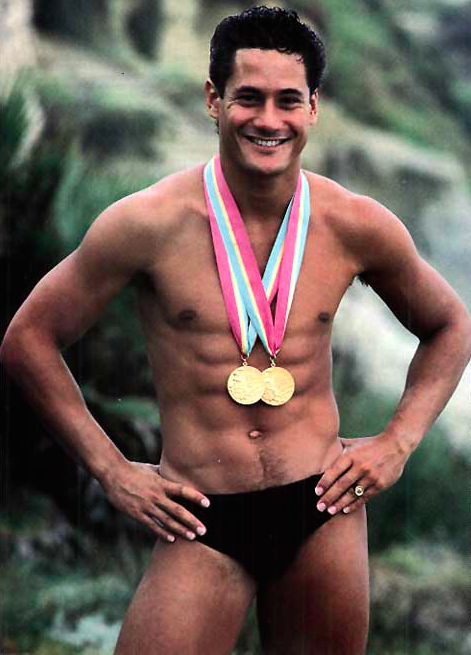AMERICAN WAY Cover Story
An oldie but a goodie: This celebrity profile actually dates back 30 years, yet everything the Olympic superstar talked about then still seems pertinent to the up-and-coming athletes we’re watching on our screens now. As a very young freelancer, Elaine flew out to L.A. to interview Louganis during a diving practice and felt like a reporter for People magazine. Photos were gorgeous, of course, so it became a cover story for American Way as well as a sentimental favorite.
** ** ** ** **
 PERFECT 10
PERFECT 10
Olympic champion Greg Louganis, the only diver to have achieved a perfect score in competition, visualizes success before he achieves it. Now, in addition to pursuing athletic endeavors, he pictures a future of acting, singing, dancing, writing and public speaking.
By Elaine Rogers
On a mild midwinter morning in sunny Los Angeles, University of Southern California students cluster around the campus’ outdoor Olympic-sized swimming pool, sporting skimpy, brightly-colored swimwear and basking in the sun, seemingly smug in their knowledge that while thy work on their ear-round tans, others around the country are battling freezing temperatures and snowstorms.
A bronzed, muscular man begins warming up on the stage of the high dive. He bounces slowly on the dip of the diving board, then turns, walks back and forth along the length of the board, and then bounces again, this time a bit harder and higher. When he finally dives, his graceful form speaks volumes of years of training and an intensity of focus that makes even the simplest dive an exercise in technique, a tribute to proper movement.
As he dives, heads turn and conversations halt. Quickly, the figure slides out of the water and reappears on the high dive before leaping and taking flight again, this time floating, curling and tumbling through the air.
To even the most untrained eye, it is obvious this is no ordinary athlete. And to many members of the poolside audience, the figure is easily-recognized as Greg Louganis —the Olympic champion and world-class diver who, for he past decade, has outclassed the rest of his field and awed the masses with his grace and power.
Louganis has a vertical leap off the board that has been measured at 33 inches — considered higher than any other diver’s and the key to his ability to “hang” in the air for long, breathtaking seconds with what some experts call a “majestic slowness.” In many ways Louganis is unrivaled in his field, and two years after the United States triumph at the Los Angeles Olympic Games, he is one of the few top U.S. Olympians still competing in world-class sporting events.
As Louganis continues another year spent training for and competing in international diving events, he is also making plans for an acting career, a soon-to-be published autobiography, and numerous appearances nationwide as a public speaker and commercial spokesperson.
The leisurely morning Louganis spent diving at USC was one of his last before he left for Boca Raton, Florida, to begin an intense, six-month raining period and a new round of international diving competitions. In the weeks preceding the start of his 1986 program, he spent a lot of time relaxing in his Malibu home, practicing at the campus pool, granting media interviews and making public appearances.
When he was younger, Louganis viewed the demands of his ever-attentive audience as a tougher burden than the constant pressure of intense international diving competitions. Confident, articulate and affable today, the athlete was so painfully shy as a 15- and 16-year-old that his former coach, Dr. Sammy Lee, used to answer al press questions for the athlete. Then, Louganis says, “I became a reporter’s nightmare because I started talking, but I was real tentative with the press.”
Eventually, Louganis overcame his shyness to the extent that he not only began handling questions with aplomb but also started regularly accepting engagements on the public speaker’s circuit.

Although Greg Louganis dominated the diving events in the 1984 Olympics, he says, “I’d like to do it again with the Russians and East Germans present.”
“I believe you can make anything fun if you do it enough and approach it with the right frame of mind,” he says. “I went from being an introverted, quiet kid to someone who makes speeches and public appearances all the time. … I just try to push myself to face my biggest fears, and that was one of them. Now I enjoy it.”
At 26, Louganis is looking at a long list of new challenges that he plans to accomplish. For instance, he recently made his Hollywood acting debut with a bit part as “a womanizing beach bum” in a movie called Dirty Laundry. Scheduled for a fall release, the comedy stars Sonny Bono, Leigh McCloskey, and Frankie Valli, and also features a similar appearance by Olympian Carl Lewis.
While audiences are viewing him in that film, Louganis says he will be auditioning for future movie roles during his fall break from training.
He also has written a book about his experience as one of the top amateur athletes in America, which he hopes will be published late this year.
“It’s kind of scary for me,” he says, “because I leave myself kind of vulnerable. I tell some things that I’m not too proud of — like the fact that I started smoking as a preteen and didn’t quit until just before the 1984 Olympics.”
This highly-visible public figure and diving superstar seems both shorter and stockier than his on-screen image, and much more comfortable in a swimsuit than in the confines of a cotton t-shirt and tennis shorts. A peppering of gray in his longish, curly dark hair adds an element of maturity to the dark, good looks that have won him almost as many fans as his athletic accomplishments. Of the constant public attention and his sex symbol status, he says, “It’s flattering, but I’s also something you have to gear up for all the time.”
He says he tries to keep the barrage of autograph-seekers in perspective by remembering that his friend are not impressed by his diving.
Some might consider this unimaginable given his record. Louganis entered international competition at the age of 13 via the World Age Group Championships, at 16, he won a silver medal in platform diving t the 1976 Olympic Games. Now, a 6-time world champion in both platform and springboard diving, and the holder of 35 U.S. national titles, he has won more than any U.S. diver in history.
The only diver to score a perfect 10 in national and international competitions, Louganis dominated the 1984 Olympic Games and won two gold medals there before being inducted into the prestigious Olympic Hall of Fame last year. Despite such amazing successes, he says he has a few more athletic goals to pursue before he’ll leave his diving career behind.
Competing in August at the World Aquatic Championships in Madrid, Spain, is a primary objective, and after that, Louganis says he will decide whether or not to attempt another set of Olympic Games. Until then, he’s “taking I one step at a time.”
Of his 1984 Olympic performance, he says, “I’m one of the few who have broken the 700-point barrier on the 10-meter platform, but I’d like to do it again with the Russians and East Germans present.”
In order to meet such athletic challenges, Louganis employs as much mental preparation as physical training. And attitude, he says, is half the battle.
He explains: “No matter how good you are, you can always strive to do better or it’s not worth doing. I’m not always at my optimum best, and I believe you can always get better.”
His mental preparation entails the practice of visualization, in which he actually “sees” himself performing a dive before he ever goes off the board.
“In the last few years it’s become a real popular topic with all the sports psychologists telling athletes they should envision themselves doing certain things before they ever do them. I was really amazed when it all started because I’d been doing it for years and s pretty surprised to realize that everybody else didn’t already do it too.
“Whether I was singing or dancing or diving, I’ve been doing mental rehearsals since I was 3 years old. Though any given competition, I will do a dive about 40 times in my head before I ever get on the board, and I’ll do it to music. Then, when I’m on the board, I just relax and stop thinking about anything, and at that point the dive becomes a reflex.”
When preparing for competition Louganis says he tries to avoid distractions such as press coverage. He explains: “Everyone is entitled to their opinion, but reading what the sportswriters are saying about you usually doesn’t have very constructive results. For instance, if I had read what they were saying about me during the Olympics, I wouldn’t have ben able to go off the board — I would have been petrified. They were calling me a superstar and a shoo-in, and hat kind of pressure will kill you.”
Natural ability and a positive attitude tend to work in a person’s favor whether the forum is diving or acting, but Louganis also relies on in-depth training.
“I’ve been singing, dancing and acting longer than I’ve been diving,” he says, pointing out that he has taken acting classes for seven years and even majored in drama and minored in dance while earning his bachelor’s degree from the University of California, Irvine, in 1983.
“Diving and acting are very similar; they are both types of performances and types of performing,” he says. Likewise, the diver has integrated different forms of dance into athletic training routine, and instead of working with weights, Lougainis says he does ballet, jazz and aerobic dance when he works out.
During his current training program at a new state-of-the-art facility in Florida, Louganis says his schedule entails two-hour diving sessions twice a day, six or seven times a week, and he undergoes leg and abdominal exercise programs as well as a shoulder strengthening routine. Although he doesn’t follow a strict diet, he says watch his weight because he tends to gain if he’s not careful. Being in training entails discipline, he adds, but not a lack of fun.
“I don’t drink and I guess I’m not a very social person as far as going out to bars or going dancing,” he says. “My idea of fun is more along the lines of playing a game of tennis with my coach or talking with friends — that’s how I let my hair down. But, I believe you can always have fun, whether you’re in training or not, no matter where you are.”
It’s a philosophy that seems to be working.
Elaine Rogers is a freelance writer based in Dallas, TX.
